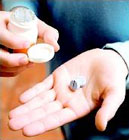14 July 2011
By Khomba Singh
New Delhi, India

The programme is being executed by the National Pharmaceutical Pricing Authority (NPPA), an autonomous government body responsible for monitoring prices of drugs to make medicines affordable for masses, along with the department of pharmaceuticals, a person familiar with the development said.
Though this promises to significantly reduce healthcare costs for the masses, there could be some medical issues and legal bottlenecks, points out CM Gulhati, editor of medical journal Monthly Index of Medical Specialties. For one, Gulhati says it is illegal for chemists to sell substitute brands for prescription medicines. Besides, in some cases, brand substitution can be harmful to patients.
There is a significant difference in the price of the costliest brand of a medicine and its cheapest alternative. A recent survey by NPPA found that prices of the expensive brands can be ten times higher than the cheapest alternative of the same medicine. Drugs are not allowed to be advertised, so companies push their brands through doctors.
There is a wide practice of companies giving gifts, sponsoring foreign trips and other incentives to doctors to prescribe their brands. Indian consumers are price–sensitive, but most are unaware they need not buy the costly brands prescribed by physicians. The purchase decision is made by their doctor. "This will curb some of the overriding power of doctors," the person added.
Low–cost drugs are not only less profitable for pharmacists but even doctors might resist brand substitution under pressure from drug firms. The possibility of substitution of their drugs with cheaper alternatives will upset the marketing strategy of large pharma companies, says Gulhati.
Mankind Pharma Managing Director Ramesh Juneja says the implications of the government’s initiative will be known only after it is implemented.
Experts say there are several other issues the government must address before launching this programme. The government has no centralised database of over 90,000 brands of drugs sold in the country, raising questions about the accuracy of the information on alternative brands provided to consumers by SMS.
"We have to take the first step," a government functionary said, adding such issues will get addressed over time.






